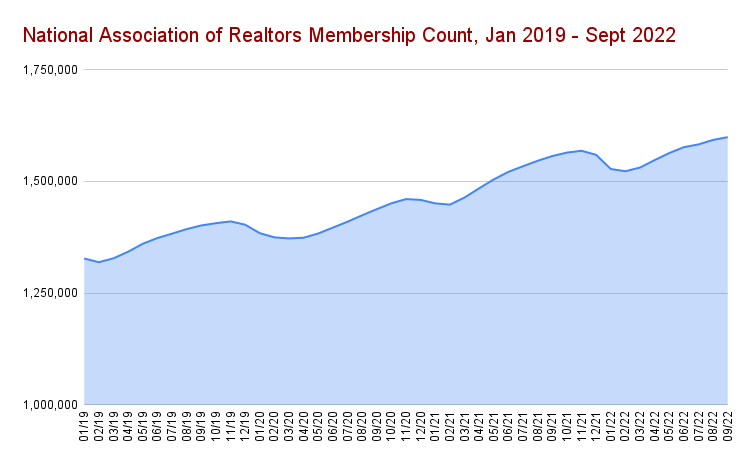A "Record" Number Of Real Estate Agents Will Quit Due To Economy, Realtor Predicts
"Those of us who make it through the next few years will need a high pain tolerance, a high skill level, and a high savings account balance."
Since Fringe Finance has started, I’ve scoured the Earth far and wide to try and bring a perspective on real estate to the blog that is going to be both no bullshit and an unfiltered on-the-ground opinion that I know and trust (and could add value to my readers). After all, it’s an asset class that I am not nearly as in-tune with as I am with equities and, well…beer.
And to be honest, I didn’t have to scour much, as a good friend of mine is a brilliant up and comer in the world of real estate in Philadelphia. I’ve worked with her several times and have known her for years - she’s insightful, pragmatic, conscientious and has a serious pulse on the industry. I know for a fact that she works her ass off, eating, sleeping and breathing real estate on the daily.
As such, my kind friend, award-winning realtor Kira Mason, has agreed to drop in once in a while to offer up her take on the pulse of the industry for benefit of my readers. Kira runs the Substack Gritty City Real Estate, which you can read & follow free here and she is @kmasonrealtor on Twitter.
Today’s post - free to read - is being syndicated with Kira’s permission. She will continue to contribute exclusive content for Fringe Finance readers as well.
Real Estate Agents Are Feeling The Burn
In the economic maelstrom within which we find ourselves thrashing around this fall, there’s been plenty of talk about the potential housing crash ahead and the future layoffs that could fuel it, but I’ve seen only a few passing comments on the job losses and pay cuts we’re almost certain to sustain within the real estate industry itself.
There are more than 3 million people holding active real estate licenses in the United States, according to the Association of Real Estate License Law Officials (ARELLO). The vast majority of these are unsalaried, receive no benefits, and earn a 100% commission-based income. Due to the extreme and immediate sensitivity of agent and broker earnings to market conditions, they might be among the first to have their wages severely impacted by the recession.
Even if home prices stay relatively stable in 2023 (a big if), depressed sales activity is likely to gouge away a sizable percentage of the earnings of those 3 million agents. Existing home sales in September were down 23.8% YoY, according to the National Association of Realtors. At this rate, an agent who makes $100k/year would see their annual income drop to something in the family of $76,000 if sales don’t go down any further and prices stay the same. With ample reason to believe that both of these metrics will decline in 2023, let’s just say the forecast is pretty grim.
I’m going to share my story at the risk of revealing the wet spots behind my ears, because I think it’s an illustrative one. In the summer of 2019, I got my real estate license and sold a few homes part time. I left my job when COVID hit and subsequently dove into real estate full time (and then some). Although I already had my license, I was effectively part of that record-breaking wave of agents who entered the industry in 2020 and 2021. In those two years put together, more than 156k new agents began their careers; that’s 60% more than in the two years prior.
Get 50% off: Today’s post is free, because I feel the content is too important to place behind a paywall. If you enjoy this article, would like to support my work and have the means, I would love to have you as a subscriber and can offer you 50% off for life:
While the real estate licensure exam is no joke, getting started as an agent is almost embarrassingly easy relative to other careers with a similar earnings potential. The mandatory pre-licensing course can be completed in 3 months for about $400 (less with a Groupon; I’m not kidding). There are longer, more rigorous, and more expensive routes to the same destination, but as every agent will tell you, 95% of what must be memorized in order to pass the test is useless once you begin your career. Real estate is truly an apprenticeship profession. For this reason, many agents-in-training opt for the quick n’ dirty path to licensure.
At least 20% of US workers decided to change careers during the pandemic. Real estate’s low barrier to entry, high earnings potential, and a record-busting housing boom were all potent motivators. According to Google Search Trends, the top job-related search in 2021 was “how to become a real estate agent”. That year, we all repeatedly heard the media quip about there being more agents in the USA than there were homes for sale. And while low inventory did mean that one’s work with a buyer was likely to be prolonged and arduous, for those who were willing to put in the hours, making money in real estate was like shooting fish in a barrel. Everyone and their brother was buying, and at least in my area, most serious shoppers were eventually ending up in new homes.
As a newly full time agent in spring of 2020, the fire under my ass was a profession to which I was not eager to return. I worked about 70 hours a week almost every week for two years. Hard work paired with a booming market allowed me to double my 5-year sales goal in my first year as a full time agent.


The truth is, similarly motivated new agents are unlikely to have the same results in 2023. It’s tough to get started in real estate. In order to be any good, you really need to treat learning the ropes like a full time job. It’s essentially an unpaid internship; you don’t make any money until you manage to convince someone that you know what you’re doing, and for a while, you don’t. In the meantime, you have to pay a laundry list of dues and fees in order to keep the machinery running. It is for this reason that 87% of agents put their licenses in escrow before their 5 year anniversary.
I predict that a record number of agents will hang up their Realtor® hats and find a different way to pay the bills in 2023. Many first-time buyers, the population most likely to work with newer agents, are getting priced out of the market and opting to rent. And older agents who were approaching retirement might decide that this is an opportune time. We’ve seen this before. In 2005-2006, 250k Americans got their real estate licenses (even more than 2020-2021). After the 2008 crash, 10% of agents left the industry.
What we’re expecting to see in 2023 is a “flight to quality”; fewer transactions will be consummated, and the buyers and sellers who remain in the market are likely to be anxious and in need of an expert to help them navigate it. The experienced and the highly scrappy alone will persevere. With an oversaturated pool of real estate professionals and a housing market farting its way into oblivion like a rapidly deflating balloon, there’s no other way.
I haven’t even brushed on the many real-estate-adjacent professions that are poised to share in the pain: lenders, inspectors, brokers, title companies, wholesalers, appraisers, real estate lawyers, developers, contractors, and more. My favorite Philly home inspector recently told me that he hasn’t had this little business in 16 years. We’re talking about a massive sector of the workforce; depressed transaction volume will affect all of them, regardless of what prices do. What makes agents particularly vulnerable to these housing market shifts is the fact that if we don’t close deals, we don’t get paid… not in six months, but today. There is no security net. Those of us who make it through the next few years will need a high pain tolerance, a high skill level, and a high savings account balance.
About Kira Mason
Kira is a realtor with Berkshire Hathaway Fox & Roach and The Kevin McGillicuddy Team, winner of the 2021 Chairman's Circle award and ranked within the top 1% of the national Berkshire Hathaway HomeServices network. She independently won Homesnap's "Fastest Growing Agent" award in 2021 and specializes in the purchase and sale of residential real estate in Philadelphia.
Kira runs the Substack Gritty City Real Estate, which you can read & follow free here and she is @kmasonrealtor on Twitter. She can be reached via e-mail at the address: contact@kiramasonrealtor.com.
QTR’s Disclaimer: I am an idiot and often get things wrong and lose money. I may own or transact in any names mentioned in this piece at any time without warning. This is not a recommendation to buy or sell any stocks or securities or any asset class - just my opinions of me and my guests. I often lose money on positions I trade/invest in. I may add any name mentioned in this article and sell any name mentioned in this piece at any time, without further warning. Positions can change immediately as soon as I publish this, with or without notice. You are on your own. Do not make decisions based on my blog. I exist on the fringe. The publisher does not guarantee the accuracy or completeness of the information provided in this page. These are not the opinions of any of my employers, partners, or associates. I did my best to be honest about my disclosures but can’t guarantee I am right; I write these posts after a couple beers sometimes. Also, I just straight up get shit wrong a lot. I mention it three times because it’s that important.









Those of us who have lived through tough markets before are more than willing to share insights for surviving and thriving.
Education and honesty are the keys. Sadly? Those two items are hard paths for many agents to admit they must pursue.
2007-2011 were my best years of my 22 year full time career. I look forward to the culling of the herd again.
My mother has been in high end real estate around Seattle for over 25 years, routinely sells 2m+ houses and has been through both of the major downturn after the dotcom and the financial crisis. Her take is for stabilizing prices with slowing sales in her market and, for what it’s worth, I tend to agree. There are 200 some licensed agents in her area and yet she has around 60 % of the listings at any given time. There are two valuable take aways from this and a caveat to follow.
One, people return to good established agents, time after time, and especially in the high end. There will likely be a large drop on the price of starter homes because these were the most over bid by the young buying population that correctly thought the time was now or never but upper and middle markets won’t budge because the buyers wont have to, the owners are less likely to lose their jobs in the coming white collar washout of junior workers, and they’re sitting on sub 3% mortgages only a fool would leave when inflation is as high as it is. Remember, houses do well in inflationary times. All the more so if you borrow $1 million plus dollars at 2.5%.
Second, if you want to crush it, be ready to grind for a long time. Sorry to say it, but if you got in during the last few years with hope of a grand income, you should probably get a different job. The old folks won’t be giving it up. And here is her caveat to new agents: there was already a movement underway to reduce commissions before all this happened. Expect that trend to continue if housing prices stabilize at these rates. 3% made sense a decade ago. Unless prices really drop it makes no sense for people to continue paying the commissions we historically have. There is also a lot of good economic research showing that agents work harder and get higher asking prices on their own homes vs. when they work for others and it just makes sense. They make money on selling. Why hang in there for another two weeks to a month for another hundred thousand to the seller on a million dollar sale when there is a $30,000 dollar paycheck waiting? I wouldn’t and most of them don’t either. When houses were selling themselves and bidders were competitive, this wasn’t an issue. It’s going to come back with a vengeance now, as will the smart people questioning the value of paying this kind of rate. My mother said she’ll retire when that finally goes down. I’d think heavily about that if I was a young up and comer.